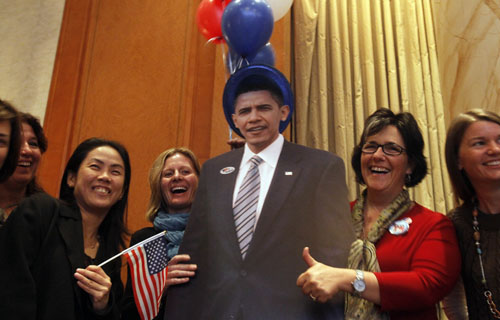|
 |
|
US residents in Shanghai pose with a cardboard cutout of President Barack Obama after the announcement of his re-election. Analysts say China will have to continue to deal with the consequences of US macroeconomic policies in coming years. [Photo/China Daily]? |
US' ultra-loose monetary policy 'to put inflationary pressure on China'
The challenge the US economy faces won't go away following President Barack Obama's election victory, nor will the possible effects on the Chinese economy, economists and financial specialists said.
Obama will face some tough fights in the next a couple of months, while economic growth may decline again, said Ethan Harris, co-head of global economic research and head of developed economies at Bank of America Merrill Lynch.
"There are limits on what the president can do to go forward" and the biggest challenge facing Obama is the "fiscal cliff", Harris told China Daily on Wednesday.
The "fiscal cliff" refers to a series of policy changes, including tax increases and spending cuts, that will take effect in January.
Obama has called for tax increases for the upper income group, which Republicans have resisted.
"Negotiations around the 'fiscal cliff' will be challenging, and uncertainty can linger in the business community," said Harris.
A priority for the Democrats and Republicans after the election is to come together to reach a compromise by the end of December, he said.
Investors will be more cautious as economic growth could fall, he added.
The US economic growth rate was 2 percent in the third quarter, while unemployment stood at 7.9 percent in October.
Once the "fiscal cliff" is resolved, the US could see a better recovery due in part to a recovery in the housing market, Harris said.
The country's property market is showing signs of recovery and growth in the housing market is expected to return to about 2.5 percent by the end of 2013 and be back to 3 percent by 2014, he said.
Long Guoqiang, senior research fellow with the State Council Development Research Center, described Sino-US economic and trade ties as "by and large positive" during Obama's first term, and said the situation is likely to be sustained in his second term due to the "highly intertwined interests" of the two nations.
"Despite there being moves toward trade protectionism under the pressure of the financial crisis, the overall economic and trade ties between the two countries are pretty good. The two countries will move more in areas such as macro policy coordination and the establishment of multilateral mechanisms," said Long.
However, Li Daokui, director of the Center for China in the World Economy at Tsinghua University, voiced concern over the impact of Obama's re-election.
"Obama is not a better problem-solver than (his challenger Mitt) Romney. I feel worried about the US economy and new economic fluctuations are very possible," Li said.
"The prospects for US economic recovery are gloomy, which will drag on the world economy, including China's. Obama is shifting his focus to international affairs in his second term and I'm concerned that China will be a target."
Zhang Ming, a senior research fellow with the Chinese Academy of Social Sciences, said it makes little difference to China whether it's the Democrats or the Republicans that are setting US domestic economic policy. Both parties are likely to adopt an ultra-loose monetary policy, generating more "hot money" and greater inflationary pressure on China.
China will have to continue to deal with the consequences of US macroeconomic policies in coming years, he said.
China on Thursday holds the 18th National Congress of the Communist Party of China, which will lead to the election of the country's new top leadership.
Harris, at Bank of America Merrill Lynch, expects the new leadership to look to smaller measures to help the economy, instead of making big changes.
"The growth peak has passed for China - no economy can grow by 10 percent forever. My assumption is around 8 percent for the next few years," he said.
He said the biggest concern for the Chinese economy is inflation and the country needs to deal with its structural issues.
Harris said the third round of quantitative easing announced by the US Federal Reserve in September is a double-edged sword.
"It's probably good for the world economy, given how fragile the US economy is right now," he said. "But the negative part is ... increasing bubbles in the asset market."
lanlan@chinadaily.com.cn
